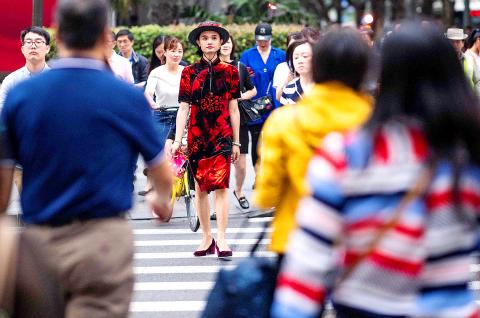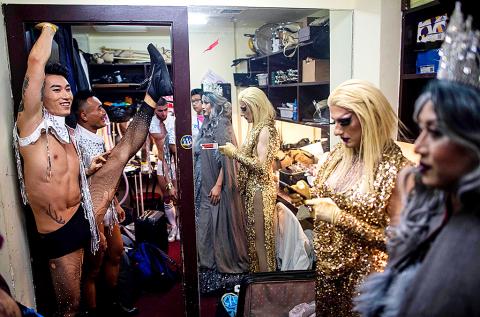Lan spent years trapped between two identities: the male gender assigned to her at birth and the woman she was inside — a living “torture” in a China not yet ready to fully embrace transgenders.
The Shanghai native, who asked that her full name be withheld, misled friends and family with a macho facade but eventually, depressed by her identity crisis, underwent gender-reassignment surgery in 2015.
“I was always between those two voices,” said Lan, 31, looking prim in a blue blouse and shoulder-length auburn hair.

Photo: AFP
“I was lonely, helpless and in despair. Now I’m living my dream.”
Long pressured to deny their identities, Chinese transgenders are quietly asserting themselves, with advocacy groups forming and doctors reporting increasing gender-reassignment surgeries.
Surgeon Zhao Yede performed 20 to 30 operations annually two decades ago. He now does around 200 per year, crediting a burgeoning online trans community with bringing people forward.

Photos: AFP
“What’s clear is [patients] are getting younger. We used to see people at 26, 27, or 30. Now we see more and more 20-year-olds,” he told AFP.
Transgenderism’s place in China has long been something of a paradox.
Ancient depictions of cross-dressing abound, and men typically played female roles onstage. Today, a few transgenders have become minor celebrities, and the lack of strident religiosity in Chinese culture minimizes overt persecution.

Photo: AFP
DOWN AND OUT
But Chinese transgenders say they remain deeply misunderstood, subject to abuse from relatives and routine discrimination.
China’s trans population is unknown, but estimates say up to 0.6 percent of Americans identify as trans. That percentage in China would equal more than eight million people.
A survey by the non-profit Beijing LGBT Center last year found nearly 62 percent of Chinese transgenders suffer depression, nearly half contemplated suicide and 13 percent attempted it.
A UNDP report last year said that among China’s LGBTs “trans people face the highest levels of discrimination, especially within the family, schools and workplaces.”
Chinese society prizes male heirs and continuing the family line, and transgenders, particularly vulnerable youths, often suffer physical and emotional abuse at home, said Zhuo Huichen, a transgender woman.
Authorities typically dismiss such abuse as family squabbling, taking no action, said Zhuo, who co-founded the Guangzhou-based Trans Center in 2016, one of China’s first trans-led NGOs.
“Some cases we see are horrible. Parents may even want to kill their children,” said Zhuo, 25.
Even Zhuo, wearing make-up and with her long hair flowing from a cat-eared cap that says “beautiful” on it, hasn’t told her parents she is transitioning to female. The center is seeing increasing numbers of transgenders seeking help, and steady reports of suicides.
“Many are minors. It’s a serious problem,” she said.
Post-surgery, Chinese trans can change their gender on government IDs but face major obstacles revising diplomas and academic records, often resulting in denial of jobs or further schooling.
Trans unemployment is three times the average, the Beijing LGBT Center’s survey said. Marginalized, some may drift into sex work.
A transgender man known as “Mr C,” who was assigned female at birth but has transitioned, was fired by a health-care company in southwestern China in 2015 over his gender identity.
But Mr C, who withholds his real name to shield his parents, won a lawsuit last year accusing the employer of violating his rights, a ruling hailed by trans people.
“I think legal protections will get better. But we have a long way to go,” he said.
The rising trans profile comes at a fraught time, however, with the ruling Communist Party increasingly accused of quashing rights and anything deemed contrary to “party morals,” and some trans fear a backlash. LGBT events are often shut down, and even hip hop music and tattoos were banned from television earlier this year as unwholesome.
GLIMMERS OF HOPE
But trans activists see glimmers of hope, and Zhuo vows “we will keep pushing.”
Last year, government guidelines began referring to “gender-reassignment” instead of “sex-change” surgery — which transgenders dislike — and no longer call transgenderism a “disease”.
Shanghai Pride, the city’s low-key LGBT festival now in its 10th year, held its first major trans forum on June 2.
Many apprehensive attendees wore stickers of a camera with a red line through it to discourage photos.
But the event, complete with an impromptu “fashion show,” went ahead unimpeded by authorities.
“I never thought I’d see that happen,” Lan said.
She has been more fortunate than most.
Initially shocked by her coming-out, Lan’s father has been supportive, accompanying her to Thailand for her US$18,000 surgery and painful five-week recovery.
A trained accountant, she still worries that having “male” on past records threatens future job prospects.
But in a happy surprise, Lan and her male former best friend recently fell in love. They plan to wed and have a child through a surrogate mother.
Lan’s future in-laws don’t know her past, a secret the couple intends to keep.
“We (trans) are stepping forward, especially the younger generation. But we have to take it slow,” she said.

In Taiwan there are two economies: the shiny high tech export economy epitomized by Taiwan Semiconductor Manufacturing Co (TSMC, 台積電) and its outsized effect on global supply chains, and the domestic economy, driven by construction and powered by flows of gravel, sand and government contracts. The latter supports the former: we can have an economy without TSMC, but we can’t have one without construction. The labor shortage has heavily impacted public construction in Taiwan. For example, the first phase of the MRT Wanda Line in Taipei, originally slated for next year, has been pushed back to 2027. The government

July 22 to July 28 The Love River’s (愛河) four-decade run as the host of Kaohsiung’s annual dragon boat races came to an abrupt end in 1971 — the once pristine waterway had become too polluted. The 1970 event was infamous for the putrid stench permeating the air, exacerbated by contestants splashing water and sludge onto the shore and even the onlookers. The relocation of the festivities officially marked the “death” of the river, whose condition had rapidly deteriorated during the previous decade. The myriad factories upstream were only partly to blame; as Kaohsiung’s population boomed in the 1960s, all household

Allegations of corruption against three heavyweight politicians from the three major parties are big in the news now. On Wednesday, prosecutors indicted Hsinchu County Commissioner Yang Wen-ke (楊文科) of the Chinese Nationalist Party (KMT), a judgment is expected this week in the case involving Hsinchu Mayor Ann Kao (高虹安) of the Taiwan People’s Party (TPP) and former deputy premier and Taoyuan Mayor Cheng Wen-tsan (鄭文燦) of the Democratic Progressive Party (DPP) is being held incommunicado in prison. Unlike the other two cases, Cheng’s case has generated considerable speculation, rumors, suspicions and conspiracy theories from both the pan-blue and pan-green camps.

Stepping inside Waley Art (水谷藝術) in Taipei’s historic Wanhua District (萬華區) one leaves the motorcycle growl and air-conditioner purr of the street and enters a very different sonic realm. Speakers hiss, machines whir and objects chime from all five floors of the shophouse-turned- contemporary art gallery (including the basement). “It’s a bit of a metaphor, the stacking of gallery floors is like the layering of sounds,” observes Australian conceptual artist Samuel Beilby, whose audio installation HZ & Machinic Paragenesis occupies the ground floor of the gallery space. He’s not wrong. Put ‘em in a Box (我們把它都裝在一個盒子裡), which runs until Aug. 18, invites